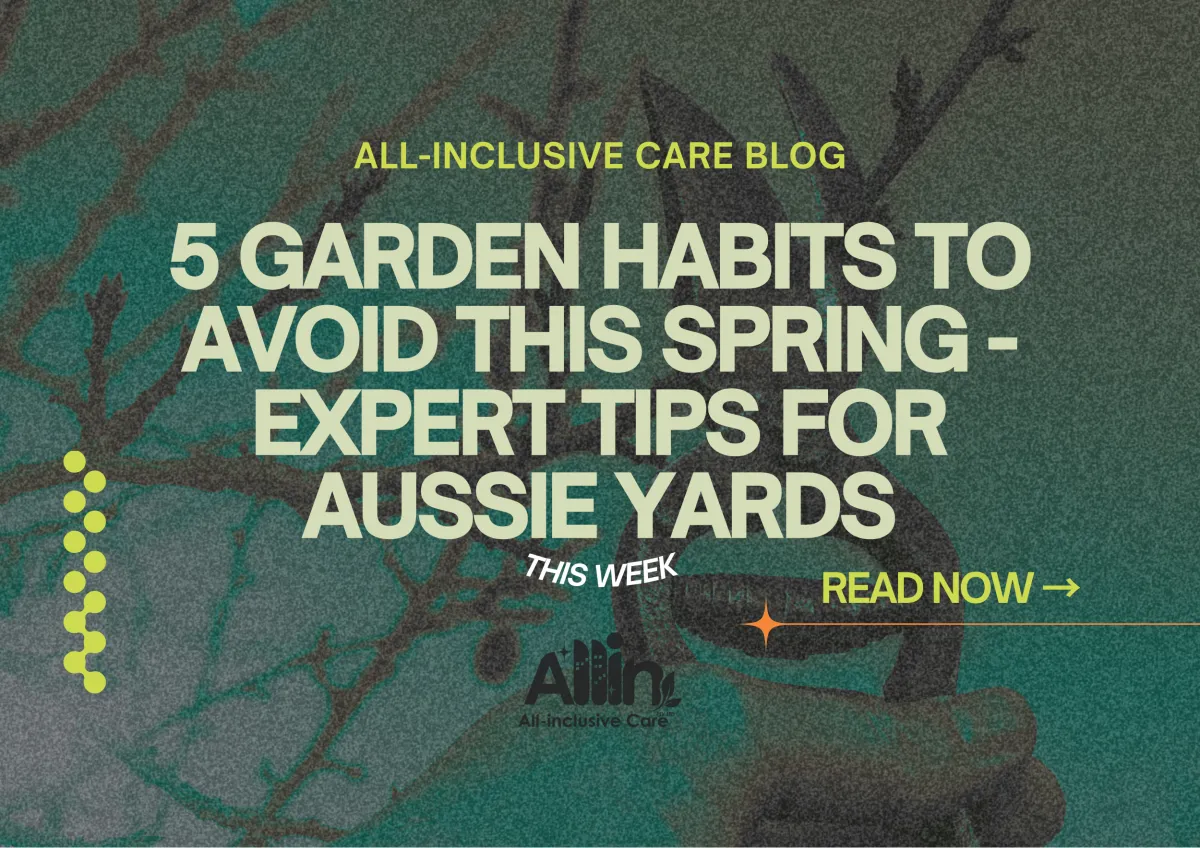
5 Garden Habits to Avoid This Spring, Expert Tips for Aussie Yards
"Discover the 5 garden habits to avoid this spring with expert tips tailored for Aussie yards. Keep your outdoor spaces healthy, beautiful, and thriving all season long." 🌿
Spring in Australia is like a green light for gardeners. The warmer weather, longer days, and bursts of colour make you want to grab your gloves and start digging right away. But here’s the truth: not every garden task you do in spring will help your yard thrive. In fact, some well-intentioned habits can actually set your garden back, creating more work for you later on and leaving your plants stressed or struggling.

5 Garden Habits to Avoid This Spring, Expert Tips for Aussie Yards 🌱
As a gardening expert, I’ve seen plenty of common mistakes that people don’t even realise are causing harm. Some of them seem harmless even logical but the impact over time can be bigger than you think. The good news is that avoiding these pitfalls isn’t difficult. With a little awareness and a few tweaks to your routine, you can set your garden up for success all season long.
So, whether you’ve got a lush backyard in Sydney, a coastal garden in Wollongong, or a small balcony space in the CBD, here are five habits to steer clear of this spring and what to do instead to keep your Aussie yard healthy and thriving.
Overwatering When the Weather Warms Up 💧
It’s tempting to give your plants extra water as soon as the temperatures rise, thinking they’ll need it to cope with the sun. But overwatering can be just as harmful as letting your garden dry out. When the soil stays too wet, it deprives roots of oxygen and can lead to fungal problems like root rot. In many cases, plants end up weaker, not stronger.
In Sydney and other parts of Australia, spring rains often do a lot of the work for you. Adding more water on top of that can push moisture levels too high. The trick is to water deeply but less frequently, encouraging roots to grow downwards and become more resilient. Always check the soil before you water if it’s still damp a few centimetres below the surface, hold off for another day or two.
A simple tip? Early morning watering is best. It allows moisture to soak in before the sun gets too hot, reducing evaporation and giving plants what they need without leaving leaves damp overnight, which can invite disease.
Cutting Back Plants Too Early ✂️
After winter, many gardeners get excited about tidying things up and start pruning everything in sight. The problem is, some plants rely on their old growth for protection while new shoots are still developing. Cutting too early can leave them exposed to sunburn, pests, or unpredictable temperature dips.
Spring pruning should be targeted, not aggressive. Remove only the dead, damaged, or diseased parts of the plant first. For flowering shrubs, know their bloom cycle if they flower on old wood, cutting too soon means you could be removing this year’s buds. For many Australian natives, late spring or early summer pruning works better because it allows them to recover from flowering before putting out new growth.
Think of pruning as a seasonal conversation with your plants. Watch how they respond to the warmer weather before making big cuts. That way, you’re working with nature’s timing, not against it.
Forgetting About the Soil 🪱
When we think about gardening, most of us focus on the plants above ground but healthy gardens always start below the surface. In spring, it’s easy to get caught up in planting, watering, and trimming while completely overlooking the soil that supports everything.
Neglected soil can become compacted, low in nutrients, or imbalanced in pH. This affects how well plants take up water and nutrients. In Australia’s varied climates, from Sydney’s coastal breezes to the drier inland heat, the right soil structure can make all the difference in plant health.
Before you add anything new to your garden, take time to prepare the soil. Loosen it with a garden fork, work in organic matter like compost, and mulch the surface to lock in moisture. If you’re unsure about nutrient levels, a soil test can guide you on whether you need to add anything specific like phosphorus for flowers or nitrogen for leafy growth. Healthy soil is like a savings account for your garden the more you invest now, the more your plants will thrive later.
Ignoring Pest Prevention 🐛
Spring’s warmer weather brings plants to life, but it also wakes up pests that have been lying low through the cooler months. Waiting until you see obvious damage before acting often means the problem has already spread.
Common spring pests in Sydney gardens include aphids, scale insects, caterpillars, and snails. These can multiply quickly, especially in lush, new growth. The key is to check your plants regularly and take action early. That doesn’t always mean harsh chemicals in fact, using them carelessly can harm beneficial insects like ladybirds and bees.
Instead, try natural deterrents like neem oil, insecticidal soap, or companion planting (for example, marigolds near veggies can help deter some pests). Encouraging biodiversity in your garden creates a natural balance that keeps pests in check without harming the ecosystem. A little prevention now saves a lot of plant drama later.
Skipping Mulching Because It “Looks Fine” 🌿
Mulching is one of the easiest ways to protect your garden, yet it’s often skipped because the soil looks okay in spring. But mulch does far more than improve appearances. It regulates soil temperature, retains moisture, suppresses weeds, and slowly adds nutrients as it breaks down.
In spring, mulch helps plants handle the transition from cooler to warmer weather. It keeps roots cooler on unexpectedly hot days and stops the soil from drying out too quickly. In places like Sydney, where spring can swing from mild to hot almost overnight, that stability is a huge benefit.
Apply a fresh layer of organic mulch about 5–7 cm thick, making sure to keep it a few centimetres away from plant stems to prevent rot. Think of mulch as the quiet protector of your garden working away in the background to keep things stable and healthy without much fuss from you.
Final Thoughts 🌸
Gardening in Australia’s spring is all about balance. You want to give your plants the best start to the season without overwhelming them or the ecosystem around them. Avoiding these five habits can make a big difference in how your garden looks and feels by the time summer arrives.
The beauty of gardening is that it’s a living, learning process. Every season teaches you something new, and every small change you make can lead to better results. By focusing on good habits and steering clear of the ones above you’re not just growing plants, you’re creating a healthier, more sustainable outdoor space.
Curious how much it would cost to mulch your property? Click here for more info!


The secret to property longevity
Learn why regular external cleaning is key to protecting your property, preventing costly damage, and boosting its value—inside and out. A smart maintenance move for homeowners, strata managers, and businesses alike.


Here's what you get:
Amazing thing you get lorem ipsum
Great bonus you get lorem ipsum
Amazing thing you get lorem ipsum
Great bonus you get lorem ipsum


Here's what you get:
Amazing thing you get lorem ipsum
Great bonus you get lorem ipsum
Amazing thing you get lorem ipsum
Great bonus you get lorem ipsum
